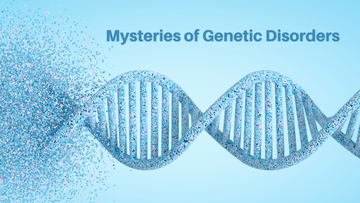Genetic disorders have long fascinated and challenged scientists and medical professionals. These illnesses arise from abnormalities in an individual's genetic makeup, causing a wide range of health issues and contributing significantly to human suffering. With advancements in medical science, our understanding of genetic disorders has grown exponentially, leading to progress in diagnostics and treatments. However, the complexity of these conditions continues to pose significant hurdles in the quest for effective solutions.
From common ailments such as cystic fibrosis to rare conditions like Tay-Sachs disease, genetic disorders affect millions of people globally, including in India. They can manifest at any stage of life, from infancy to adulthood, and vary significantly in severity and type. Understanding the origins, symptoms, and treatment possibilities of these disorders is crucial for patients and medical professionals alike.
Also Read: The Importance Of Nutrition: Key to a Healthier Life and Optimal Well-being
What Is a Genetic Disease?
A genetic disease is a condition caused by abnormalities in an individual's DNA. These abnormalities can be in the form of mutations in a single gene, multiple genes, chromosomal abnormalities, or mitochondrial mutations. Genetic disorders can be inherited from one or both parents, or they can occur spontaneously due to new mutations in the affected individual.
The nature of genetic diseases is diverse. Some disorders are caused by mutations in single genes (monogenic disorders), such as cystic fibrosis or sickle cell anemia. Others result from complex interactions between multiple genes and environmental factors (multifactorial inheritance disorders), such as heart disease or diabetes. Additionally, chromosomal disorders like Down syndrome arise from anomalies in chromosome number or structure.
Symptoms of Genetic Problems
Developmental Delays
Developmental delays are common in genetic disorders. Children may lag in milestones like speech, motor skills, or social behavior. These delays often become evident in the early years and may persist, necessitating ongoing therapy and support.
Physical Abnormalities
Physical abnormalities, such as unusual facial features, limb deformities, or growth deficiencies, can signal genetic issues. These can vary from minimal cosmetic differences to severe deformities requiring medical intervention.
Cognitive Impairments
Many genetic disorders lead to cognitive impairments. These can range from mild learning disabilities to severe intellectual disabilities. Conditions like Fragile X syndrome or Down syndrome often include varying degrees of cognitive impairment.
Metabolic Problems
Metabolic disorders, such as phenylketonuria (PKU), arise from genetic conditions that affect metabolic pathways. Symptoms can include poor growth, developmental delays, and, if untreated, severe intellectual disability.
Neurological Symptoms
Neurological symptoms such as seizures, muscle weakness, or coordination difficulties can occur in genetic disorders. Conditions like Huntington's disease or muscular dystrophy exemplify this category, presenting significant daily challenges for affected individuals.
Also Read: Understanding Height and Weight Charts: How Age Influences Standards
Genetic Disorders List (Common in India)
India, with its diverse population and high rate of consanguineous marriages, has a unique genetic landscape. Here are some genetic disorders particularly prevalent in the Indian population.
Thalassemia
Thalassemia is a blood disorder caused by mutations in the HBB gene, leading to reduced hemoglobin production. It is particularly common in India, especially in regions like Gujarat, Punjab, and West Bengal. The disorder results in severe anemia, requiring regular blood transfusions and chelation therapy.
Sickle Cell Anemia
Sickle cell anemia, caused by a mutation in the HBB gene, is another blood disorder prevalent in India, particularly among tribal populations in central and southern India. It leads to misshapen red blood cells, severe pain, and potential organ damage.
Down Syndrome
Down syndrome is a chromosomal disorder caused by an extra copy of chromosome 21 (trisomy 21). It is associated with developmental delays, characteristic facial features, and an increased risk of certain medical conditions. Although Down syndrome occurs worldwide, its prevalence in India necessitates special attention in the context of early diagnosis and intervention.
Cystic Fibrosis
While less common in India than in Western countries, cystic fibrosis is still a concern. This monogenic disorder affects the respiratory and digestive systems, leading to chronic lung infections and digestive complications.
Duchenne Muscular Dystrophy
Duchenne muscular dystrophy (DMD) is a severe form of muscular dystrophy caused by mutations in the DMD gene. It leads to progressive muscle weakness and loss of motor function, primarily affecting boys in early childhood.
Is Genetic Disease Curable?
The curability of genetic diseases varies significantly. Currently, many genetic disorders are not curable, but treatments can often manage symptoms and improve quality of life. Advances in gene therapy offer some hope for potential cures in the future. For instance, research in CRISPR technology and other gene-editing techniques aims to correct specific genetic mutations at their source.
Supportive treatments such as medication, physical therapy, and surgical interventions can help manage symptoms and complications. Prenatal genetic testing and counseling provide crucial information for expecting parents, enabling them to make informed decisions about their pregnancies and future children.
Also Read: Understanding Which Age is Best for Gym Workouts: When Should You Start Exercising
Conclusion
Genetic disorders present a complex and multifaceted challenge within the medical field. Understanding these conditions through the lenses of genetics and genomics has opened new avenues for research and treatment. While many genetic conditions currently lack complete cures, advancements in science and medicine offer hope for better management and potential future solutions.
The importance of ongoing research cannot be overstated. Continued investment in genetic studies, gene therapy, and related technologies holds promise for uncovering new treatments and, perhaps one day, cures. Public awareness and understanding are equally critical, helping to reduce stigma and improve the lives of those affected by genetic disorders.
As science progresses, the future for individuals with genetic disorders looks increasingly hopeful. With collaborative efforts from researchers, medical professionals, and the public, the pursuit of effective treatments and potential cures remains a passionate and achievable goal.








